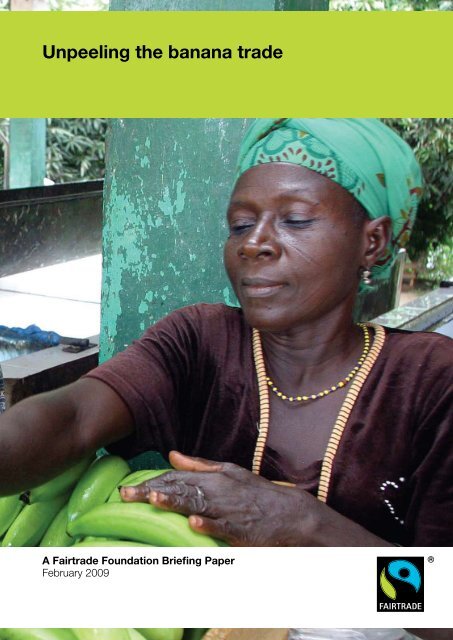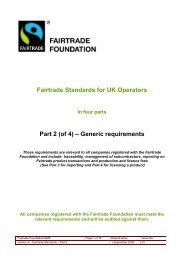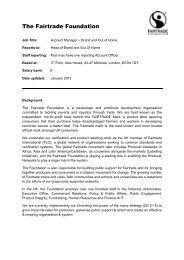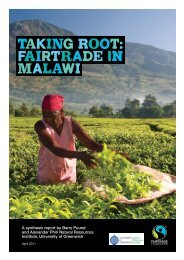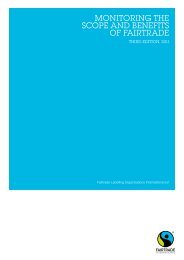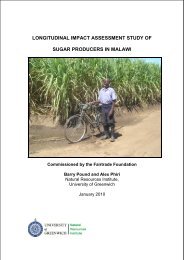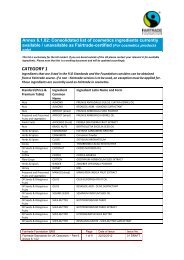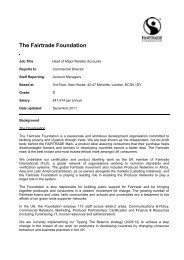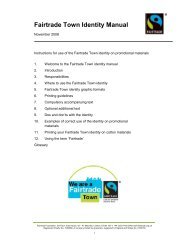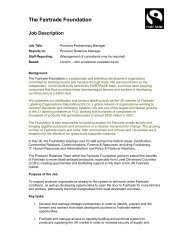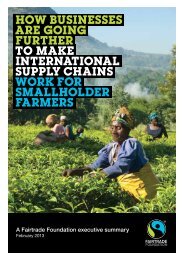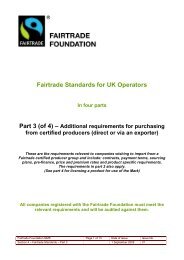Bananas: Unpeeling the Banana Trade - The Fairtrade Foundation
Bananas: Unpeeling the Banana Trade - The Fairtrade Foundation
Bananas: Unpeeling the Banana Trade - The Fairtrade Foundation
Create successful ePaper yourself
Turn your PDF publications into a flip-book with our unique Google optimized e-Paper software.
<strong>Unpeeling</strong> <strong>the</strong> banana trade<br />
A <strong>Fairtrade</strong> <strong>Foundation</strong> Briefing Paper<br />
February 2009
<strong>Banana</strong> facts<br />
• <strong>The</strong> banana is <strong>the</strong> most popular fruit in <strong>the</strong> world – shoppers<br />
spend more than £10 billion a year on <strong>the</strong> fruit globally 1<br />
• <strong>Fairtrade</strong> bananas now account for nearly 2% of <strong>the</strong> total world<br />
trade in fresh bananas<br />
• <strong><strong>Banana</strong>s</strong> are <strong>the</strong> world’s fourth most important crop after rice,<br />
wheat and maize in terms of ensuring food security in dozens<br />
of countries in <strong>the</strong> developing world 2<br />
• Just 15% of bananas and plantains are traded on <strong>the</strong> world<br />
market, <strong>the</strong> rest are used for domestic consumption 3<br />
• Production and trade in bananas is dominated by five companies<br />
– Chiquita, Dole, Del Monte, Noboa and Fyffes – which control<br />
more than 80% of global trade 4<br />
• <strong>The</strong> majority of banana plantation workers do not earn enough<br />
to provide for <strong>the</strong>ir families – some earn less than £1 a day<br />
• Between 2002 and 2008, supermarket price wars saw <strong>the</strong> UK<br />
retail price of loose bananas slashed by up to 41%<br />
• In 2008, one in every four bananas sold in <strong>the</strong> UK was <strong>Fairtrade</strong><br />
• In 2008, <strong>the</strong> value of <strong>the</strong> UK <strong>Fairtrade</strong> banana market was<br />
£150 million<br />
• <strong>The</strong> UK banana industry as a whole is worth £580<br />
million annually<br />
• <strong><strong>Banana</strong>s</strong> are <strong>the</strong> third most valuable product sold in UK<br />
supermarkets – only petrol and lottery tickets out sell <strong>the</strong>m<br />
• Between 2000 and 2008, <strong>Fairtrade</strong> certified producer groups<br />
and <strong>the</strong>ir communities received around $28 million in <strong>Fairtrade</strong><br />
premiums just from <strong>the</strong> UK sales of <strong>Fairtrade</strong> bananas<br />
1Calculation by <strong>Banana</strong> Link on basis of FAO trade statistics 2005<br />
2FAO figures<br />
3Ibid. 4FAO/UNCTAD figures
Executive summary<br />
<strong>The</strong> banana: cheap, colourful and <strong>the</strong> UK’s firm favourite in <strong>the</strong> fruit department. But delve into<br />
<strong>the</strong> reality behind <strong>the</strong> piles of yellow fruit on our supermarket shelves and <strong>the</strong> story is not always so<br />
sunny. This briefing sets out to explain why we all need to go fur<strong>the</strong>r and make <strong>Fairtrade</strong> bananas<br />
<strong>the</strong> norm in our shops and supermarkets. It explains why <strong>the</strong> situation for so many banana<br />
producers remains so precarious, describes <strong>the</strong> impact that <strong>Fairtrade</strong> has had in <strong>the</strong> banana<br />
sector so far and identifies what more can be done to support those at <strong>the</strong> bottom of <strong>the</strong> banana<br />
supply chain.<br />
Nine years on from <strong>the</strong>ir launch, <strong>the</strong> success of <strong>Fairtrade</strong> bananas in <strong>the</strong> UK market is<br />
remarkable. With one banana in every four sold in <strong>the</strong> UK now carrying <strong>the</strong> FAIRTRADE Mark,<br />
<strong>the</strong>y are rapidly becoming part of <strong>the</strong> nation’s everyday shop. With this growth has come positive<br />
change to <strong>the</strong> lives of thousands of banana farmers and plantation workers. But <strong>the</strong> damaging<br />
trends of production and trade that made <strong>the</strong> introduction of <strong>Fairtrade</strong> so vital still dominate <strong>the</strong><br />
global banana industry.<br />
As bananas have become increasingly popular, retail prices have dropped significantly, forcing<br />
prices down across <strong>the</strong> entire supply chain in a race to <strong>the</strong> bottom. This pressure inevitably results<br />
in lower wages, longer hours and worsening working conditions for many plantation workers who<br />
are often paid pittance wages – less than £1 a day in some cases – not enough to provide for <strong>the</strong>ir<br />
families. <strong>The</strong>y are very often prevented from forming trade unions to protect <strong>the</strong>ir rights and improve<br />
<strong>the</strong>ir situation. <strong>The</strong> increasing use of casual and sub-contracted labour results in fur<strong>the</strong>r abuses of<br />
workers’ rights.<br />
<strong>The</strong> picture for small-scale banana farmers is no better. New EU agreements in response to WTO<br />
rulings, coupled with devastating storms, have spelt disaster for small farmers in <strong>the</strong> Caribbean. In<br />
<strong>the</strong> Windward Islands more than 20,000 of 25,000 farmers have gone out of business since 1992<br />
and more farmers lose <strong>the</strong>ir livelihoods in Ecuador, Jamaica and o<strong>the</strong>r countries each time <strong>the</strong> price<br />
<strong>the</strong>y receive for <strong>the</strong>ir bananas falls below <strong>the</strong> cost of production. <strong>Fairtrade</strong> has provided a lifeline for<br />
<strong>the</strong>se farmers – 85% of <strong>the</strong> surviving farmers in <strong>the</strong> Windwards are now certified <strong>Fairtrade</strong> – however<br />
ongoing trade reforms remain a serious threat.<br />
<strong>The</strong> success of <strong>Fairtrade</strong> bananas can be attributed to UK consumers’ engagement with <strong>the</strong><br />
problems facing small-scale banana farmers and plantation workers, <strong>the</strong>ir corresponding pressure<br />
upon supermarkets to stock <strong>Fairtrade</strong> alternatives and <strong>the</strong>ir commitment to buying <strong>Fairtrade</strong><br />
bananas on a regular basis.<br />
But, just as bananas symbolise <strong>the</strong> success of <strong>the</strong> <strong>Fairtrade</strong> movement so far, <strong>the</strong>y also clearly<br />
illustrate <strong>the</strong> challenges that still lie ahead. Nine years of <strong>Fairtrade</strong> bananas in <strong>the</strong> UK have brought<br />
benefits to producers, but <strong>the</strong>y are still vulnerable to food and fuel price rises, climate change and<br />
ever more stringent demands from retailers. As well as scaling up <strong>the</strong> reach and impact of <strong>Fairtrade</strong><br />
in <strong>the</strong> banana industry we need to create an international economic system in which trade not only<br />
helps to eliminate poverty but also empowers people to take <strong>the</strong>ir future into <strong>the</strong>ir own hands.<br />
page 1 <strong>Unpeeling</strong> <strong>the</strong> banana trade
5<br />
1. <strong>The</strong> changing supply<br />
of UK bananas<br />
14<br />
6<br />
3<br />
1<br />
10<br />
7<br />
16<br />
9<br />
4<br />
13<br />
19<br />
20<br />
18<br />
15<br />
1.1 <strong>The</strong> traditional players<br />
Before 1993, historical UK trading relationships meant that<br />
most Caribbean bananas were guaranteed a market in<br />
Britain. Most of Britain’s bananas came from St Lucia, St<br />
Vincent, Dominica and Grenada (collectively <strong>the</strong> Windward<br />
Islands), as well as Jamaica, Belize and Surinam.<br />
<strong>The</strong> advent of <strong>the</strong> Single European Market caused a<br />
radical shift in supply as <strong>the</strong> various national trading<br />
arrangements were harmonised under a single import<br />
system. As <strong>the</strong> European market has become more<br />
open, retailers have started to source more directly from<br />
producers, inevitably choosing lower-cost suppliers,<br />
resulting in bananas from Latin American plantations<br />
and now West Africa replacing higher-cost ones<br />
from traditional Caribbean smallholders.<br />
Between 1992 and 2007, UK banana imports increased<br />
from 545,000 tonnes to 927,000 tonnes, a growth of<br />
41%. In <strong>the</strong> same period, imports from Caribbean<br />
countries fell from 70% to less than 30% of imports.<br />
Cheaper Latin American ‘dollar’ bananas, almost<br />
insignificant in 1992, now make up around half of UK<br />
imports, with Costa Rica <strong>the</strong> UK’s biggest banana supplier<br />
accounting for 25% of total imports in 2007.<br />
Caribbean producers remain almost entirely dependent on<br />
UK sales and so <strong>the</strong>ir falling share of <strong>the</strong> UK market has<br />
had a devastating effect. Dominica, St Vincent and<br />
St Lucia have lost more than 20,000 of <strong>the</strong>ir 25,000<br />
small-scale banana growers since 1992. <strong>The</strong>re are now<br />
less than 4,000 small farmers remaining of which over<br />
3,500 are <strong>Fairtrade</strong> certified. 5<br />
page 2 <strong>Unpeeling</strong> <strong>the</strong> banana trade<br />
8<br />
21<br />
12<br />
17<br />
11<br />
O<strong>the</strong>r countries<br />
1 Ecuador<br />
2 Philippines<br />
3 Costa Rica<br />
4 Colombia<br />
5 Guatemala<br />
6 Honduras<br />
7 Panama<br />
8 Brazil<br />
9 Peru<br />
10 Nicaragua<br />
240,000<br />
220,000<br />
200,000<br />
180,000<br />
160,000<br />
140,000<br />
120,000<br />
100,000<br />
80,000<br />
60,000<br />
40,000<br />
20,000<br />
0<br />
Volume<br />
(tonnes)<br />
1992<br />
2007<br />
2<br />
ACP<br />
EU<br />
11 Cameroon<br />
19 Martinique<br />
12 Ivory Coast 20 Guadeloupe<br />
13 Dominican Republic 21 Canary Islands<br />
14 Belize<br />
15 Surinam<br />
16 Jamaica<br />
17 Ghana<br />
18 Windward Islands<br />
UK banana imports by principal countries<br />
(1992 and 2007)<br />
Dominica<br />
St Lucia<br />
St Vincent<br />
Belize<br />
Cameroon<br />
Dominican<br />
Republic<br />
Ivory Coast<br />
Jamaica<br />
Country<br />
Source: DEFRA 2008<br />
Surinam<br />
Grenada<br />
Colombia<br />
Costa Rica<br />
Ecuador<br />
Guatemala<br />
Honduras<br />
Panama<br />
Venezuela<br />
France<br />
O<strong>the</strong>r EU
In response to growing consumer demand for <strong>Fairtrade</strong><br />
and/or organic bananas, countries such as <strong>the</strong> Dominican<br />
Republic and Colombia, which have substantial volumes<br />
of both, have grown in importance as suppliers.<br />
<strong>The</strong> leading companies importing bananas into <strong>the</strong> UK<br />
include four multinationals: Chiquita, Dole/JP Fruit, Fyffes,<br />
and Del Monte; and three independents: SH Pratt, Mack<br />
Multiples and Windwards <strong><strong>Banana</strong>s</strong>. <strong>The</strong>se same<br />
companies also ripen and distribute <strong>the</strong> fruit. Although<br />
market share figures change rapidly with changes in retail<br />
supply chains, <strong>the</strong>y all have a market share of between<br />
10% and 20%, except Windwards <strong><strong>Banana</strong>s</strong><br />
(approximately 6%). Toge<strong>the</strong>r <strong>the</strong>se companies control<br />
over 98% of <strong>the</strong> UK market. 6<br />
1.2 <strong>The</strong> new arrivals<br />
In 2006, around 81 million tonnes of bananas were<br />
produced around <strong>the</strong> world, of which 17 million tonnes<br />
were exported. 7 Traditional banana exporting countries<br />
are facing fur<strong>the</strong>r challenges in <strong>the</strong> form of major new<br />
producing countries entering <strong>the</strong> market with <strong>the</strong> potential<br />
to reshape <strong>the</strong> world banana economy. <strong>The</strong> world’s two<br />
largest banana-producing countries – India and Brazil –<br />
toge<strong>the</strong>r grow almost double <strong>the</strong> volume that is traded<br />
worldwide but currently consume <strong>the</strong> majority of this<br />
domestically. In India, three state governments – Gujarat,<br />
Maharashtra and Kerala – are all actively encouraging<br />
farmers to upgrade <strong>the</strong>ir technology and enter <strong>the</strong> export<br />
market. At this stage, <strong>the</strong>re have only been trial shipments<br />
to Middle Eastern markets, but if <strong>the</strong> Indian initiatives<br />
go ahead, this will have a global impact. Indeed a<br />
spokesman for <strong>the</strong> Indian fruit exporter Tata Chemicals<br />
recently predicted that ‘India, in <strong>the</strong> next five to ten years,<br />
will [become <strong>the</strong> world’s] largest grape and banana<br />
exporter so <strong>the</strong>re is big potential in <strong>the</strong> business.’ 8<br />
Brazil’s exports to its Sou<strong>the</strong>rn neighbours and to<br />
Europe have grown rapidly this millennium, reaching<br />
around 250,000 tonnes a year.<br />
In Africa, <strong>the</strong> promise of zero tariff entry to <strong>the</strong> EU because<br />
of some countries’ Least Developed Country’ status has<br />
attracted fruit company investment. In Ghana, Dole<br />
started exporting from new plantations in 2006, while<br />
Chiquita has tested new varieties in Côte d’Ivoire, with<br />
planting of crops for export now underway. Chiquita<br />
technicians have also acquired land on <strong>the</strong> coastal<br />
plains of Angola, a country which has never<br />
previously been involved in banana exports. 9<br />
<strong>The</strong> development of new banana companies with a<br />
capacity to move into o<strong>the</strong>r markets is also a challenge<br />
to <strong>the</strong> dominance of <strong>the</strong> established companies. JFC, <strong>the</strong><br />
5 Communication from Windwards <strong><strong>Banana</strong>s</strong>.<br />
6 Information compiled by <strong>Banana</strong> Link from trade sources.<br />
7 United Nations Food and Agriculture Organization.<br />
8 Freshinfo News. Saturday 10 January 2009.<br />
9 Communication from <strong>Banana</strong> Link.<br />
page 3 <strong>Unpeeling</strong> <strong>the</strong> banana trade<br />
biggest of <strong>the</strong> new Russian companies, not only imports<br />
Ecuadorian bananas for <strong>the</strong> Russian market, but has<br />
invested in its own plantations, in shipping and in a retail<br />
chain, making it <strong>the</strong> world’s first fully ‘vertically integrated’<br />
fruit company, with ownership of <strong>the</strong> entire supply chain.<br />
1.3 <strong>Fairtrade</strong> in <strong>the</strong> UK market<br />
Following several years of hard work to put <strong>Fairtrade</strong><br />
structures in place, <strong>the</strong> Windward Islands shipped <strong>the</strong><br />
first ever <strong>Fairtrade</strong> bananas to <strong>the</strong> UK in 2000. <strong>The</strong> overall<br />
market has grown from 5,500 tonnes that year to 158,000<br />
tonnes in 2007. Driven by <strong>the</strong> commitment of Sainsbury’s<br />
and Waitrose to convert to 100% <strong>Fairtrade</strong> bananas, sales<br />
are on track to reach 193,000 tonnes for 2008, an overall<br />
growth of 3,400%. To meet this growing demand, 63<br />
producer organisations from eight countries (Ghana,<br />
Ecuador, Peru, Colombia, Windward Islands, Costa Rica,<br />
Jamaica and <strong>the</strong> Dominican Republic) have now been<br />
certified, with 42 of <strong>the</strong>m supplying <strong>Fairtrade</strong> bananas<br />
to <strong>the</strong> UK.<br />
350<br />
300<br />
250<br />
200<br />
150<br />
100<br />
50<br />
0<br />
Value<br />
(£000)<br />
Growth of <strong>the</strong> UK <strong>Fairtrade</strong> banana market (by value)<br />
(2000-2007)<br />
1999<br />
Year<br />
2000<br />
2001<br />
2002<br />
Sources: DEFRA and <strong>Fairtrade</strong> <strong>Foundation</strong><br />
Conventional<br />
<strong>Fairtrade</strong><br />
<strong>The</strong> initial success of <strong>Fairtrade</strong> bananas owes much to<br />
dedicated <strong>Fairtrade</strong> companies like <strong>the</strong> Dutch pioneer<br />
Agrofair which imported <strong>the</strong> world’s first <strong>Fairtrade</strong> bananas<br />
into Europe in 1996. It is co-owned by <strong>the</strong> farmers who<br />
grow <strong>the</strong> fruit it imports and markets exclusively <strong>Fairtrade</strong><br />
fruit and juices, having now expanded into mangoes,<br />
citrus fruits and pineapples.<br />
2003<br />
2004<br />
2005<br />
2006<br />
2007
2. <strong>Banana</strong> trade wars<br />
<strong>The</strong> European Union is a hugely significant player in <strong>the</strong><br />
world banana trade, importing about a third of all traded<br />
bananas – about <strong>the</strong> same amount as North America –<br />
and more than three times that of Japan and Russia, <strong>the</strong><br />
third and fourth biggest importers. EU policies <strong>the</strong>refore<br />
have a major impact on <strong>the</strong> world trade in bananas. While<br />
<strong>the</strong> EU banana import system of quotas and tariffs has<br />
been at <strong>the</strong> centre of global trade disputes, reforms<br />
introduced on 1 January 2006 have drastically reduced<br />
<strong>the</strong> level of market intervention.<br />
2.1 <strong>The</strong> story so far<br />
<strong>The</strong> formation of <strong>the</strong> Single European Market in 1992<br />
meant that <strong>the</strong> European Union had to consolidate <strong>the</strong><br />
various tariff and quota arrangements across European<br />
countries for <strong>the</strong> importation of bananas. 10 Following<br />
lengthy debates, a system of both quotas and tariffs was<br />
adopted in July 1993.<br />
<strong>The</strong> EU arrangements however were non-compliant with<br />
World <strong>Trade</strong> Organization (WTO) rules which promote<br />
trade liberalisation by removing trade barriers such as<br />
quotas, tariffs, and subsidies. Latin American banana<br />
exporting countries and <strong>the</strong> USA lodged a series of legal<br />
challenges at <strong>the</strong> WTO claiming that <strong>the</strong> EU regime<br />
discriminated against Latin American producers and<br />
hampered <strong>the</strong> expansion of, mainly US, multinational<br />
companies.<br />
In response, <strong>the</strong> EU agreed to end <strong>the</strong> quota system<br />
and introduce a single tariff for all banana imports. As an<br />
interim measure, <strong>the</strong> WTO agreed that <strong>the</strong> EU could waive<br />
<strong>the</strong> single tariff and continue tariff-free entry for bananas<br />
from African, Caribbean and Pacific (ACP) countries in<br />
order to honour long-term commitments that would end<br />
in 2008. 11<br />
<strong>The</strong> crux of <strong>the</strong> argument regarding <strong>the</strong> tariff was that<br />
Latin American governments and companies wanted<br />
to ensure that <strong>the</strong> single tariff was set at a level <strong>the</strong>y<br />
believed would be low enough to make it remunerative<br />
for <strong>the</strong>ir businesses. However small farmers’<br />
organisations, plantation workers’ unions and many<br />
NGOs argued that by simply removing quotas and using<br />
tariffs, <strong>the</strong> market would be flooded with cheaper<br />
bananas, pushing import prices down, threatening<br />
millions of livelihoods as multinational banana companies<br />
abandoned higher-cost producing countries in search<br />
of cheaper production. On top of that, if <strong>the</strong> tariff was<br />
fixed too low, higher-cost producers like <strong>the</strong> small<br />
farmers of <strong>the</strong> Windward Islands were under threat of<br />
being squeezed out of <strong>the</strong> market altoge<strong>the</strong>r.<br />
Following multiple rounds of consultation and debate <strong>the</strong><br />
EU eventually implemented in 2006 a single tariff of<br />
g176/tonne which in effect only applied to Latin<br />
American imports as duty-free entry for ACP imports was<br />
maintained for a volume which effectively covered all <strong>the</strong>ir<br />
EU exports. As predicted, since 2006 import volumes<br />
from both Latin America and West Africa have grown<br />
while prices inside <strong>the</strong> EU fell and, as feared, price-cutting<br />
by major European retailers is fur<strong>the</strong>r squeezing <strong>the</strong> pay<br />
and conditions of plantation workers at <strong>the</strong> bottom of <strong>the</strong><br />
banana supply chain. 12<br />
However <strong>the</strong> matter didn’t end <strong>the</strong>re. In 2007, Ecuador<br />
and Colombia lodged complaints that <strong>the</strong> EU reforms<br />
had hit <strong>the</strong>ir EU banana sales and <strong>the</strong> US again<br />
complained that duty-free access for ACP countries was<br />
discriminatory. <strong>The</strong> EU protested that <strong>the</strong> US action would<br />
only damage ongoing talks with all parties, including<br />
negotiations with ACP governments to sign new<br />
Economic Partnership Agreements (EPAs) that would<br />
resolve <strong>the</strong>se issues.<br />
EU and Latin American ministers were on <strong>the</strong> verge of<br />
signing a historic breakthrough deal at <strong>the</strong> WTO Doha<br />
Round meeting in Geneva in July 2008 that would see<br />
incremental cuts in <strong>the</strong> tariff. This could spell <strong>the</strong> end of<br />
<strong>the</strong> banana export industry for Caribbean growers, but<br />
having run out of options, <strong>the</strong> ACP group accepted <strong>the</strong><br />
deal on <strong>the</strong> understanding that it came with additional<br />
development aid to restructure remaining industries and<br />
assist those forced out of business. However <strong>the</strong> deal fell<br />
through amidst <strong>the</strong> collapse of wider trade negotiations<br />
to slash tariffs and subsidies for farm products.<br />
A prospective meeting for December 2008 failed to<br />
materialise so whe<strong>the</strong>r or not trade ministers can reach<br />
agreement on <strong>the</strong> Doha Round in 2009 – including<br />
reviving <strong>the</strong> deal on bananas – now remains to<br />
be seen.<br />
10 Import tariffs are taxes imposed on internationally traded goods whilst quotas limit <strong>the</strong> volume of goods that can be imported.<br />
11ACP countries are <strong>the</strong> 46 African, Caribbean and Pacific countries that are signatories of <strong>the</strong> Cotonou agreement with <strong>the</strong> European Union.<br />
12 According to EUROSTAT figures, imports of <strong>the</strong> big four Latin American exporting countries taken toge<strong>the</strong>r rose by 9% from 2005 to 2006, although Ecuador’s<br />
volume fell; West African exports rose by over 15%.<br />
page 4 <strong>Unpeeling</strong> <strong>the</strong> banana trade
<strong>Banana</strong> wars: a timeline<br />
1992 Formation of a single European market<br />
1993 Harmonisation of banana import arrangements into <strong>the</strong> EU using a tariff and quota<br />
system which maintains preferential treatment for ACP countries<br />
1993 <strong>The</strong> US, Honduras, Guatemala, Ecuador, Panama and Mexico lodge complaint at GATT 13<br />
(predecessor of <strong>the</strong> WTO)<br />
2001 EU agrees to end preferential access arrangements and put in place single tariff by 2006<br />
which continues to deliver existing protection and market access until 2008<br />
2004 EU announces tariff negotiations will begin at g230/tonne<br />
2005 EU finally agrees a single tariff of g176/tonne<br />
2006 New single tariff regime implemented<br />
2007 Ecuador and Colombia lodge complaints at WTO that new regime is discriminatory<br />
2008 (Jul) Breakthrough banana deal agreed which would see incremental cuts in tariff to g114/tonne<br />
by 2016 but WTO Doha Round negotiations in Geneva collapse along with banana deal<br />
2008 (Nov) WTO rejects EU appeal against its decision that EU banana regime is inconsistent<br />
with global trade rules<br />
2.2 What role EPAs?<br />
In parallel talks starting in 2002, <strong>the</strong> EU and ACP<br />
governments have been negotiating regional EPAs to<br />
replace <strong>the</strong> trade sections of <strong>the</strong> Cotonou and Lomé<br />
agreements that date back to 1975 and which enshrine<br />
<strong>the</strong> preferential treatment for ACP imports.<br />
<strong>The</strong> EPAs are intended to put in place new free trade<br />
deals that are compatible with WTO rules from <strong>the</strong> outset.<br />
Under WTO rules, trade deals must open up ‘substantially<br />
all trade’ between partners but <strong>the</strong>y also allow for <strong>the</strong><br />
gradual opening up of markets for sensitive and emerging<br />
ACP country industries.<br />
13 <strong>The</strong> General Agreement on Tariffs and <strong>Trade</strong> whose main objective was <strong>the</strong> reduction of barriers to trade.<br />
page 5 <strong>Unpeeling</strong> <strong>the</strong> banana trade<br />
However, <strong>the</strong> EU has been accused by NGOs, civil<br />
society groups, think tanks and prominent academics of<br />
using bullying tactics to push through an aggressive trade<br />
strategy with ACP countries that goes beyond WTO<br />
requirements and forces <strong>the</strong>m to open up <strong>the</strong>ir markets<br />
in a way that could be disastrous for local economies<br />
and <strong>the</strong> livelihoods of millions of people. So far only <strong>the</strong><br />
Caribbean regional grouping has officially signed<br />
a ‘comprehensive’ EPA (covering goods and services<br />
and investment) but, with indications of a change of<br />
negotiating style on <strong>the</strong>ir part, <strong>the</strong> EU hopes to conclude<br />
negotiations with all ACP countries by <strong>the</strong> end of 2009.<br />
Never<strong>the</strong>less, significant concerns remain about <strong>the</strong> terms<br />
of <strong>the</strong> agreements currently on <strong>the</strong> table and who will<br />
benefit most.
3. <strong>Banana</strong> price wars<br />
<strong><strong>Banana</strong>s</strong> occupy a unique position in <strong>the</strong> shopping basket<br />
of <strong>the</strong> British consumer. After petrol and National Lottery<br />
tickets, <strong>the</strong>y are <strong>the</strong> third most valuable of all products<br />
sold by <strong>the</strong> major supermarkets. Like o<strong>the</strong>r staples<br />
such as bread, milk and baked beans, price-conscious<br />
consumers are likely to know how much bananas cost<br />
and to use <strong>the</strong>m to judge <strong>the</strong> relative value for money<br />
offered by <strong>the</strong> different supermarket chains for o<strong>the</strong>r<br />
products. 14 This means that <strong>the</strong>se products are<br />
particularly vulnerable to being used in price-cutting<br />
battles between supermarkets in <strong>the</strong> competition to win<br />
<strong>the</strong> hearts and purses of <strong>the</strong> UK shopper. In recent years<br />
short-term price-cutting has been a regular feature of<br />
spring marketing strategies designed to increase market<br />
share by enticing non-regular customers through<br />
<strong>the</strong> door. 15<br />
As a result of <strong>the</strong> series of price wars between <strong>the</strong> major<br />
supermarkets, <strong>the</strong> retail price of conventional loose<br />
bananas fell by a full 41%, from £1.10 a kilo to 64p,<br />
between 2002 and 2007 (although <strong>the</strong>y had increased<br />
to around 95p by <strong>the</strong> end of 2008). Recent reports have<br />
indicated that <strong>the</strong> global financial crisis and higher fruit and<br />
shipping costs will increase <strong>the</strong> price of bananas to <strong>the</strong><br />
supermarkets, 16 however in January 2009 ano<strong>the</strong>r leading<br />
supermarket had slashed prices again to 82p per kilo. 17<br />
Contrary to popular belief however, <strong>the</strong> evidence indicates<br />
that sales of bananas do not rise during price promotions<br />
and seems to confirm that price cuts are not driven by<br />
consumer demand for cheaper bananas.<br />
4. <strong>The</strong> producers<br />
<strong>The</strong>re are two main models of banana production for<br />
international export: small-scale farms and plantations.<br />
<strong>Fairtrade</strong> labelling was set up in <strong>the</strong> late 1980s to increase<br />
market access for small-scale farmers (at <strong>the</strong> bottom<br />
of <strong>the</strong> supply chain) who were struggling to survive<br />
amid tumbling prices and uncertainties related to<br />
liberalisation of agricultural commodities. Since <strong>the</strong>n<br />
<strong>Fairtrade</strong> has been extended to commercial farm<br />
enterprises as a means of increasing <strong>the</strong> empowerment<br />
and well-being of <strong>the</strong>ir workers.<br />
4.1 Small farmers – surviving against <strong>the</strong> odds<br />
Smallholders are independent family farmers who use<br />
mainly family labour. In <strong>the</strong> case of bananas, <strong>the</strong>y generally<br />
employ one or two permanent workers and bring in casual<br />
labour for <strong>the</strong> fortnightly harvest.<br />
Unless supermarkets absorb price cuts within <strong>the</strong>ir own<br />
profit margins (which <strong>the</strong>y occasionally do), any drop in<br />
retail prices inevitably gets passed down <strong>the</strong> supply chain.<br />
This means that ultimately <strong>the</strong>re is just not enough money<br />
reaching countries of origin to provide decent livelihoods,<br />
wages and working conditions. 18 <strong>The</strong> impacts of this race<br />
to <strong>the</strong> bottom upon <strong>the</strong> banana producers and workers<br />
at <strong>the</strong> bottom of <strong>the</strong> supply chain are described in more<br />
detail below.<br />
<strong>The</strong> vast majority of family farmers who have survived in<br />
<strong>the</strong> international banana trade are in <strong>the</strong> Caribbean. <strong>The</strong><br />
only countries where family farms dominate <strong>the</strong> banana<br />
export economy are Dominica, St Vincent and St Lucia<br />
in <strong>the</strong> Windward Islands. Small-scale farmers are always<br />
at a disadvantage in terms of economies of scale, but with<br />
bananas this is exacerbated by <strong>the</strong> fruit’s highly perishable<br />
nature. Losing one consignment to hurricanes or disease<br />
won’t necessarily pose a risk to a large plantation, but can<br />
be enough to knock a small farm out of business. This<br />
vulnerability also makes <strong>the</strong>m less attractive to buyers<br />
who need to ensure year-round consistency of supply.<br />
For farmers in <strong>the</strong> Caribbean, <strong>the</strong> geography of <strong>the</strong>ir<br />
islands also works against <strong>the</strong>m. Growing areas are<br />
mountainous, with poor soil conditions and low yields.<br />
14 <strong>Banana</strong> Link. ‘Collateral Damage: How price wars between supermarkets helped to destroy livelihoods in <strong>the</strong> banana and pineapple supply chain.’ November 2006.<br />
15<strong>The</strong> Grocer.<br />
16Freshinfo News. Saturday 10 January 2009.<br />
17Daily Mirror. 14 January 2009.<br />
18 <strong>Banana</strong> Link. ‘Collateral Damage: How price wars between supermarkets helped to destroy livelihoods in <strong>the</strong> banana and pineapple supply chain.’ November 2006.<br />
page 6 <strong>Unpeeling</strong> <strong>the</strong> banana trade<br />
1.15<br />
1.10<br />
1.05<br />
1.00<br />
0.95<br />
0.90<br />
0.85<br />
0.80<br />
0.75<br />
0.70<br />
0.65<br />
Price<br />
(£/Kg)<br />
Average weekly UK retail price of bananas*<br />
(2000-2008)<br />
Jan-00<br />
Jan-01<br />
Jan-02<br />
Jan-03<br />
Year<br />
*<strong>The</strong> average weekly retail price of bananas at Tesco, Sainsbury’s, Somerfield, Morrisons, Safeway/ASDA<br />
Source: Fyffes<br />
Jan-04<br />
Jan-05<br />
Jan-06<br />
Jan-07<br />
Jan-08
Higher shipping, distribution and labour costs all<br />
contribute to a much higher overall production cost than<br />
Latin American plantation production. Small farmers are<br />
also less able to respond to increasing demands for<br />
standardised fruit quality and large volumes. More and<br />
more retailers also require technical quality standards<br />
such as GLOBALGAP 19 from all <strong>the</strong>ir suppliers and small<br />
producers have limited capital to invest in meeting <strong>the</strong>se<br />
needs. Hurricanes and flooding are frequent in <strong>the</strong><br />
Caribbean. For smallholders, losing a crop to <strong>the</strong> wea<strong>the</strong>r<br />
can be disastrous and it can take several months before<br />
any fruit can be harvested again. Substantial outlay is<br />
required to buy more banana plants. Without o<strong>the</strong>r crops<br />
to fall back on, or savings to shoulder <strong>the</strong> extra cost and<br />
feed a family while business is poor, <strong>the</strong> situation<br />
is desperate. This too has knock-on effects on <strong>the</strong> local<br />
economy.<br />
<strong>Fairtrade</strong> is unique because at its heart<br />
lies <strong>the</strong> need of small-scale producers<br />
for market access under fair trading<br />
conditions. No o<strong>the</strong>r ethical trade initiative<br />
addresses <strong>the</strong> problems faced by<br />
family-based producers working at <strong>the</strong> far<br />
end of global supply chains over which<br />
<strong>the</strong>y have virtually no influence, but in<br />
which decisions are made that can affect<br />
<strong>the</strong>ir whole lives.<br />
In Colombia and Ecuador small farmers are treated by<br />
exporters as a kind of buffer supply – <strong>the</strong>ir fruit is in<br />
demand when <strong>the</strong> market is in short supply; but when <strong>the</strong><br />
market is oversupplied <strong>the</strong>y are forced to accept prices<br />
below <strong>the</strong>ir costs of production or are simply unable to<br />
sell at all. <strong>The</strong> response of many small growers in South<br />
America and <strong>the</strong> Caribbean has been to come toge<strong>the</strong>r<br />
in associations and co-operatives (which enables <strong>the</strong>m to<br />
share costs, market information and technical support) in<br />
order to supply higher value speciality markets such as <strong>the</strong><br />
organic and/or <strong>Fairtrade</strong> markets. This is a very positive<br />
development, but it has not prevented many thousands of<br />
small-scale banana farmers from losing <strong>the</strong>ir livelihoods.<br />
In Ecuador, every time <strong>the</strong> price falls below <strong>the</strong> costs of<br />
production (as it does for several months of <strong>the</strong> year),<br />
ano<strong>the</strong>r raft of small producers goes out of banana<br />
production. Whe<strong>the</strong>r in <strong>the</strong> Windwards or South America,<br />
<strong>the</strong>re are often few alternatives for farmers to migrating to<br />
urban areas or to <strong>the</strong> rich countries where <strong>the</strong>ir bananas<br />
are consumed.<br />
19 GLOBALGAP standards certify Good Agricultural Practice as required by European retailers.<br />
page 7 <strong>Unpeeling</strong> <strong>the</strong> banana trade<br />
After decades in which smallholders have been<br />
squeezed out of markets by larger plantations, <strong>the</strong> world<br />
is beginning to wake up to <strong>the</strong> damage this has caused<br />
socially and environmentally. <strong>The</strong> <strong>Fairtrade</strong> model<br />
demonstrates that small-scale farmers can achieve<br />
greater productivity while preserving <strong>the</strong> natural<br />
environment and <strong>the</strong> well-being of people working on<br />
<strong>the</strong> land, as well as delivering high-quality products.<br />
For small-scale farmers to remain economically viable and<br />
benefit from international trade <strong>the</strong>y will need improved<br />
access to credit, farm inputs and technical support.<br />
4.2 Plantation workers: bearing <strong>the</strong> costs<br />
of cheap bananas<br />
<strong>The</strong> o<strong>the</strong>r main type of production takes place on<br />
medium- and large-scale plantations that hire labour all<br />
year round. A typical plantation is 250 hectares although<br />
<strong>the</strong>y can be as large as 5,000 hectares. <strong>The</strong>y generally<br />
employ one worker per hectare of commercial bananas<br />
although in <strong>the</strong> most productive plantations, <strong>the</strong>re may<br />
be as little as one worker per 1.5 hectares. Compared<br />
to o<strong>the</strong>r cash crops however, bananas remain a highly<br />
labour-intensive crop and today over 90% of bananas<br />
entering world trade are produced on plantations where<br />
large numbers of workers are present.<br />
Most of <strong>the</strong> Latin America industry is characterised by<br />
large-scale plantations, many owned by US companies<br />
(hence <strong>the</strong> name ‘dollar’ bananas), on flat coastal lands.<br />
In many countries <strong>the</strong> plantations are controlled ei<strong>the</strong>r by<br />
<strong>the</strong> big multinationals with ‘vertically integrated’ operations<br />
(from plantation ownership to importing and ripening<br />
facilities in <strong>the</strong> consumer countries), or by national<br />
companies that sell to <strong>the</strong> same multinationals.<br />
<strong>Fairtrade</strong> also has a wider ambition to<br />
assist all people who are disadvantaged by<br />
conventional trade, and landless labourers<br />
are among those in greatest need of our<br />
model. We will ensure that our work with<br />
plantations complements o<strong>the</strong>r initiatives<br />
seeking to secure and enhance labour<br />
rights in <strong>the</strong> global South.<br />
Given that <strong>the</strong> vast majority of banana trade is supplied<br />
by plantations and that it has been a very profitable crop<br />
for fruit companies and retailers, it would be reasonable<br />
to expect that <strong>the</strong> benefits might be shared with <strong>the</strong> half a<br />
million or so workers in <strong>the</strong> world’s banana plantations.
4. <strong>The</strong> producers continued<br />
For a period in <strong>the</strong> 1970s and early 1980s, it was indeed<br />
<strong>the</strong> case that banana plantation jobs in many countries<br />
were seen as <strong>the</strong> best agricultural work. It was a source<br />
of pride to work in a plantation. Wages were<br />
considerably higher than typical agricultural wages, and<br />
many workers were covered by <strong>the</strong> benefits negotiated by<br />
<strong>the</strong> independent trade unions <strong>the</strong>y had struggled to form<br />
over previous decades. Today however, <strong>the</strong> situation is<br />
quite different as a result of <strong>the</strong> never-ending downward<br />
pressure to cut prices and production costs all along <strong>the</strong><br />
supply chain. 20<br />
<strong>The</strong> effect on plantation workers in Latin America of <strong>the</strong><br />
drive to cut labour costs and increase productivity has<br />
been dramatic and manifold: increasingly casualised<br />
working relationships; long hours and low wages;<br />
anti-trade union activity; intensive use of agrochemicals;<br />
poor health and safety standards; and lack of access to<br />
proper healthcare. <strong>The</strong>se are described in more detail<br />
below. In Africa, where costs are lower, <strong>the</strong> medium- and<br />
large-scale plantations in Cameroon, Cote d’Ivoire and<br />
Ghana tend to employ more workers per hectare than in<br />
Latin America and working conditions are not quite so<br />
harsh (although invariably <strong>the</strong>y don’t receive a living wage):<br />
in general, working days are not as long and, because<br />
fewer chemicals are applied for climatic reasons, workers<br />
are less exposed to pesticides. 21<br />
4.3 Wages and working conditions<br />
Ra<strong>the</strong>r than increasing, banana workers’ wages have<br />
actually fallen dramatically over <strong>the</strong> past 15 years. <strong>The</strong><br />
majority of banana plantation workers do not earn enough<br />
to provide for <strong>the</strong>ir families – some still earn less than £1<br />
per day. 22 An eight-hour working day in Costa Rica in<br />
1993 would earn a monthly wage of $250. Four years<br />
later <strong>the</strong> equivalent was just $187, and by 2003 <strong>the</strong><br />
minimum agricultural wage remained <strong>the</strong> same in dollars,<br />
while <strong>the</strong> cost of living had nearly doubled. 23 A study<br />
commissioned by <strong>The</strong> Co-operative Group in 2004<br />
concluded that Costa Rican workers considered a basic<br />
‘living wage’ would be at least 50% higher than <strong>the</strong><br />
typical wage prevailing in plantations. 24 In Ecuador, <strong>the</strong><br />
government’s own figures show that <strong>the</strong> minimum<br />
agricultural wage of $160 a month (which is more than<br />
many workers receive) only buys about a third of <strong>the</strong> basic<br />
household food basket.<br />
<strong>The</strong>re has also been a downward trend in <strong>the</strong> number<br />
of permanent contracts available for workers and <strong>the</strong><br />
increasing use of casual labour and contractors. This<br />
process of hiring workers through o<strong>the</strong>r companies or on<br />
a short-term basis enables plantation owners to avoid<br />
responsibility for workers rights. It also often prevents<br />
workers from claiming <strong>the</strong>ir statutory employment<br />
benefits, or from joining a union, as in Ecuador. 25<br />
<strong>The</strong> situation for women workers, who are mainly<br />
employed in <strong>the</strong> packing-houses, is of particular concern<br />
in many producing countries. Many banana companies do<br />
not respect basic rights such as maternity leave and<br />
regular healthcare and <strong>the</strong>re are no childcare facilities on<br />
<strong>the</strong> plantations. 26 In fact employers have been employing<br />
fewer and fewer women so as to avoid <strong>the</strong>se<br />
responsibilities. In addition, women are working in a<br />
culture that has not historically challenged sexual<br />
harassment in <strong>the</strong> workplace. 27<br />
4.4 <strong>Trade</strong> union power<br />
Joining and forming independent trade unions in order to<br />
fight for improved conditions is one of <strong>the</strong> most important<br />
ways that workers can secure <strong>the</strong>ir rights. While all <strong>the</strong><br />
banana exporting countries in Latin America have ratified<br />
<strong>the</strong> main conventions of <strong>the</strong> International Labour<br />
Organisation (ILO), including <strong>the</strong> freedom to join a union,<br />
<strong>the</strong>se conventions are often not enforced on <strong>the</strong> ground.<br />
<strong>The</strong> regional coordinating body of banana workers’<br />
unions, COLSIBA, estimates that only about 10% of Latin<br />
American workers are union members. Of <strong>the</strong>se, well<br />
over half have been able to negotiate collective bargaining<br />
agreements – labour contracts that outline <strong>the</strong> agreed<br />
outcomes of collective bargaining negotiations on pay<br />
and working conditions – with <strong>the</strong>ir employers.<br />
An ILO study of banana plantations in Costa Rica<br />
concluded that ‘trade union organisations are persecuted<br />
and repressed. Dismissed for <strong>the</strong>ir trade union activities,<br />
workers are placed on blacklists that circulate among <strong>the</strong><br />
plantation owners. <strong>The</strong>y will never find work again.’<br />
A more recent ILO report confirms that this situation<br />
persists. 28<br />
20Gilberth Bermudez. ‘Working Conditions in Latin American <strong>Banana</strong> Plantations.’ IBC II. 2005.<br />
21Communication from <strong>Banana</strong> Link.<br />
22 ‘News from <strong>the</strong> <strong>Banana</strong> Front.’ Issue 11. <strong>Banana</strong> Link. January 2007.<br />
23Ibid 17.<br />
24 ‘<strong>The</strong> Real Wage Situation of Male and Female Workers in 11 <strong>Banana</strong> Plantations in Costa Rica, in Comparison to a Living Wage”, ASEPROLA, November 2004.<br />
25ITUC Annual Survey of Violations of <strong>Trade</strong> Union Rights 2008.<br />
26 Preparatory documents for IBC II. 2005.<br />
27 Ibid 13.<br />
28Report of ILO Mission to Costa Rica. 2007.<br />
page 8 <strong>Unpeeling</strong> <strong>the</strong> banana trade
Since <strong>the</strong> 1990s, Latin American banana companies<br />
have increasingly relied on cheap migrant labour as a way<br />
of bringing down labour costs. In Belize, owners have<br />
recruited a largely migrant workforce from neighbouring<br />
countries and use <strong>the</strong> threat of deportation whenever<br />
workers have tried to organise <strong>the</strong>mselves to secure<br />
improvements.<br />
In o<strong>the</strong>r countries, Colombia and Guatemala for example,<br />
<strong>the</strong> situation is even more serious with reports that trade<br />
union members and leaders have been systematically<br />
murdered by private security forces, paramilitaries or<br />
guerrilla groups as a means of deterring o<strong>the</strong>rs from<br />
becoming involved in union activities. 29<br />
<strong>Fairtrade</strong> standards aim to go fur<strong>the</strong>r than<br />
<strong>the</strong> norms of ethical assurance and our<br />
focus on promoting sustainable<br />
development means that we make a<br />
difference by changing situations ra<strong>the</strong>r<br />
than simply certifying a status quo. Our<br />
standards endorse worker organisation<br />
through democratic and independent<br />
trade unions as <strong>the</strong> best way of protecting<br />
labour rights, and collective bargaining as<br />
<strong>the</strong> best process for agreeing employment<br />
conditions.<br />
4.5 Workers’ health and environment<br />
<strong><strong>Banana</strong>s</strong> are susceptible to a host of diseases particularly<br />
in monoculture production models such as plantations.<br />
As a result, banana farms have increasingly relied on <strong>the</strong><br />
use of pesticides and fungicides to produce <strong>the</strong> ‘perfect’<br />
fruit that buyers demand. <strong>The</strong>se chemicals have had a<br />
severely harmful effect on workers’ health and can cause<br />
significant environmental damage when used intensively<br />
or improperly applied.<br />
Chemicals are both aerially sprayed and applied<br />
manually. It is estimated that a high proportion of<br />
pesticides sprayed onto crops from planes fail to land on<br />
<strong>the</strong> plants <strong>the</strong>mselves, instead falling onto <strong>the</strong> soil and<br />
into waterways, affecting workers on <strong>the</strong> plantations, and<br />
in <strong>the</strong>ir nearby homes. Some countries, including Costa<br />
Rica, have passed legislation stating that workers should<br />
not be in <strong>the</strong> fields when spraying takes place, but <strong>the</strong>se<br />
laws are routinely violated. Indeed employers not only<br />
ignore this legislation, but sometimes discipline workers<br />
who fail to continue working during aerial spraying. Since<br />
<strong>the</strong> living quarters of workers (and <strong>the</strong>ir families) are often<br />
inside or adjacent to <strong>the</strong> plantations, <strong>the</strong>ir homes are<br />
sprayed and <strong>the</strong>y consume chemical-coated plants from<br />
<strong>the</strong>ir gardens, and drink or wash with contaminated water.<br />
Toxic chemical residues also abound in <strong>the</strong> soil, water<br />
and sediment in areas adjacent to <strong>the</strong> plantations. <strong>The</strong><br />
intensive production of bananas places huge demands<br />
on <strong>the</strong> water courses and careless storage of chemicals<br />
leads to regular pollution incidents, with drastic<br />
consequences for aquatic life. Polluted water used in<br />
<strong>the</strong> packing sheds to wash bananas is sometimes also<br />
recycled for use by workers and <strong>the</strong>ir families living on <strong>the</strong><br />
plantations.<br />
<strong>The</strong> health impacts of this cocktail of pesticides include<br />
depression, respiratory problems, damage to <strong>the</strong> eyes,<br />
skin infections, sterility and cancers. Women can ei<strong>the</strong>r<br />
miscarry or give birth to children with birth defects. 30<br />
A study by <strong>the</strong> Health Research Institute at <strong>the</strong> National<br />
University of Costa Rica found that women in <strong>the</strong><br />
country’s banana packing plants suffered double <strong>the</strong><br />
average rate of leukaemia and birth defects. 31 <strong>The</strong>re are<br />
unlikely to be medical staff on <strong>the</strong> plantation and <strong>the</strong><br />
doctors who do treat workers are often employed by <strong>the</strong><br />
companies and are <strong>the</strong>refore unwilling to identify exposure<br />
to chemicals or industrial injuries.<br />
29 Information from <strong>Banana</strong> Link.<br />
30 Yamileth Astorga. ‘<strong>The</strong> environmental impact of <strong>the</strong> banana industry.’ IBC II. 2005.<br />
31 “Daño del ADN en trabajadoras bananeras expuestas a plaguicidas en Limón, Costa Rica”, Vanessa Ramírez and Patricia Cuenca,<br />
Instituto de Investigaciones en Salud (INISA). Universidad de Costa Rica. 2002.<br />
page 9 <strong>Unpeeling</strong> <strong>the</strong> banana trade
5. What difference has<br />
<strong>Fairtrade</strong> made?<br />
<strong>Fairtrade</strong> is increasingly important to producers and<br />
workers who have been left vulnerable to market forces<br />
that have a negative impact on prices and working<br />
conditions. <strong>Fairtrade</strong> offers a more profitable and<br />
sustainable way of trading through:<br />
• Guaranteeing fair and stable minimum prices<br />
which cover <strong>the</strong> costs of sustainable production<br />
• Providing an additional <strong>Fairtrade</strong> premium for<br />
investment in economic, social or environmental<br />
improvements 32<br />
• Long-term trading relationships to allow farmers to<br />
plan for <strong>the</strong> future<br />
• Safeguarding workers’ rights and securing progress<br />
to better pay and conditions<br />
• Ensuring respect for <strong>the</strong> environment by using<br />
environmentally sound agricultural practices.<br />
Below are just a few of <strong>the</strong> stories from <strong>the</strong> thousands<br />
of people who have benefited from sales of <strong>Fairtrade</strong><br />
bananas so far. What <strong>the</strong>y have in common is that<br />
<strong>Fairtrade</strong> has supported <strong>the</strong>ir producer organisations to<br />
develop <strong>the</strong>ir democracy, participation and empowerment<br />
alongside delivering significant economic benefits. 33<br />
In 1996 our plantation was on <strong>the</strong> verge of<br />
collapse and Solidaridad, <strong>the</strong> Dutch NGO<br />
behind <strong>the</strong> [<strong>Fairtrade</strong> company]<br />
Agrofair, stepped in and bought 25% of<br />
<strong>the</strong> company’s shares on behalf of <strong>the</strong><br />
workers. <strong>The</strong> cash was injected into <strong>the</strong><br />
plantations and <strong>the</strong> company was revived.<br />
This is a remarkable thing that <strong>Fairtrade</strong><br />
has done. Alex Yeboah-Afari, Personnel<br />
Manager, VREL<br />
5.1 Economic impact<br />
As conventional banana prices have declined, <strong>Fairtrade</strong><br />
prices to producers have remained stable. 34 This has<br />
proved a lifeline for many small farmers who have few<br />
economic alternatives. As Arthur Bobb of <strong>the</strong> Windward<br />
Islands Farmers’ Association (WINFA), has said: ‘If <strong>the</strong><br />
Windward Islands had not made <strong>the</strong> switch to <strong>Fairtrade</strong><br />
we may have been out of <strong>the</strong> market by now.’ <strong>The</strong><br />
success of <strong>the</strong> banana industry also has a knock-on<br />
effect on <strong>the</strong> economic activities of <strong>the</strong> wider community<br />
because of <strong>the</strong> increased spending capacity in <strong>the</strong> local<br />
community. Pension benefits are very rare in Dominica<br />
so most farmers have no income once <strong>the</strong>y retire.<br />
<strong>The</strong> <strong>Fairtrade</strong> premium has allowed a fund to be<br />
established to provide a lump sum payment on retirement<br />
which cushions <strong>the</strong> transition when farmers are too old to<br />
work on <strong>the</strong>ir farms.<br />
For workers such as those at Volta River Estates Limited<br />
(VREL) in Ghana, <strong>the</strong> plantation provides much needed<br />
jobs in an area with high unemployment and in a country<br />
with no social security system and which has only recently<br />
adopted a national healthcare system.<br />
In Ecuador, farmers and workers in and around <strong>the</strong><br />
banana growing communities of Tenguel, El Guabo and<br />
La Libertad have significantly improved <strong>the</strong> incomes<br />
of around 2,000 rural families, in a country where rural<br />
poverty remains endemic, by developing <strong>the</strong>ir organisation<br />
through <strong>Fairtrade</strong>. <strong>The</strong>se <strong>Fairtrade</strong> farmers generate<br />
incomes around double <strong>the</strong> average for small farmers<br />
in <strong>the</strong> area, and have created a model of how to build<br />
producers’ businesses by taking full control of <strong>the</strong><br />
marketing of <strong>the</strong>ir bananas from farm to port through<br />
<strong>the</strong>ir stake in <strong>the</strong> trading company Agrofair.<br />
<strong>Fairtrade</strong> can also provide <strong>the</strong> means to allow farmers<br />
to diversify into o<strong>the</strong>r livelihood opportunities. Farmers<br />
in <strong>the</strong> Windwards have for example moved into growing<br />
coconuts for <strong>the</strong> export market. <strong>The</strong> Montaque Project,<br />
which is being funded by <strong>the</strong> <strong>Fairtrade</strong> premium,<br />
involves <strong>the</strong> purchase of an agro-processing facility by<br />
farmers to enable new product development and<br />
diversification through business development. A banana<br />
ripening centre is also under development in St Lucia to<br />
take advantage of potential new local market possibilities<br />
and provide additional income for <strong>the</strong> farmers.<br />
<strong>Fairtrade</strong> coconuts more than anything<br />
are about hope. Now we are successfully<br />
bringing coconuts over, we can go ahead<br />
with <strong>Fairtrade</strong> mangoes and maybe in <strong>the</strong><br />
future we will have a whole cluster of<br />
<strong>Fairtrade</strong> produce in <strong>the</strong> UK market.<br />
Simeon Greene, Relations Director,<br />
Windwards <strong><strong>Banana</strong>s</strong><br />
32 <strong>The</strong> <strong>Fairtrade</strong> premium on plantations is spent by <strong>the</strong> Joint Body which comprises democratically elected workers’ representatives, plus management<br />
representatives to provide support. For small farmers organisations, a Premium Committee manages projects agreed by its members.<br />
33 <strong>The</strong> <strong>Fairtrade</strong> standards can be found at www.fairtrade.net<br />
34 <strong>Fairtrade</strong> banana prices are country-specific taking into account both costs of production and <strong>the</strong> need to minimise price<br />
competition between <strong>Fairtrade</strong> certified producers.<br />
page 10 <strong>Unpeeling</strong> <strong>the</strong> banana trade
5.2 Empowerment<br />
Empowerment is at <strong>the</strong> heart of <strong>Fairtrade</strong> with producer<br />
organisations as well as individual farmers reaping <strong>the</strong><br />
benefit. <strong>The</strong> streng<strong>the</strong>ning of small farmers’ organisations<br />
is a key means of improving <strong>the</strong>ir position and bargaining<br />
power in <strong>the</strong> supply chain.<br />
<strong>Fairtrade</strong> is empowering people to<br />
manage <strong>the</strong>ir own affairs – <strong>the</strong><br />
development of human capacity that is<br />
so vital for <strong>the</strong> future. With <strong>Fairtrade</strong>,<br />
small farmers have been transformed from<br />
marginalised farmers into businessmen.<br />
Amos Wilshire, <strong>Fairtrade</strong> Coordinator,<br />
WINFA, Dominica<br />
In <strong>the</strong> Windwards, <strong>Fairtrade</strong> is seen as empowering<br />
farmers who previously had almost no role in<br />
decision-making in <strong>the</strong>ir own industry. Even in <strong>the</strong> days<br />
when banana prices were attractive enough to make a<br />
good living, <strong>the</strong>y were essentially contract growers for a<br />
now defunct international company. Now though as Colin<br />
Borton, who works for Windwards <strong><strong>Banana</strong>s</strong> in <strong>the</strong> UK,<br />
comments: ‘<strong>The</strong>re is an enhanced sense of participation<br />
in <strong>the</strong> banana industry, an increased social awareness<br />
within communities both by farmers and, as a knock-on<br />
effect, by <strong>the</strong> community as a whole…. <strong>Fairtrade</strong> has<br />
rekindled farmers’ hope and confidence, which was in<br />
serious decline. Farmers now have an unmistakable pride<br />
in <strong>the</strong>ir work, a concept seriously lacking before <strong>the</strong><br />
introduction of <strong>Fairtrade</strong>.’<br />
Similarly <strong>the</strong> right of workers to organise into unions<br />
empowers <strong>the</strong>m to secure <strong>the</strong>ir rights. On <strong>the</strong> VREL<br />
plantation as a result of <strong>Fairtrade</strong>, <strong>the</strong> management, in<br />
negotiation with <strong>the</strong> local branch of <strong>the</strong> General<br />
Agricultural Workers Union (GAWU), has introduced<br />
benefits almost unheard of in Ghana, including increasing<br />
wages to 30% above <strong>the</strong> national minimum. All employees<br />
now have permanent contracts and are entitled to<br />
maternity, sick, compassionate and study leave.<br />
5.3 Social impact and well-being<br />
<strong>The</strong> unique <strong>Fairtrade</strong> premium is often invested in<br />
improvements which benefit <strong>the</strong> wider community and<br />
which cover a range of local needs. For example, in <strong>the</strong><br />
Dominican Republic <strong>the</strong> farmers of <strong>the</strong> ASOBANU<br />
page 11 <strong>Unpeeling</strong> <strong>the</strong> banana trade<br />
co-operative have invested in schools, sports, healthcare<br />
and production facilities, including a new wing of a school<br />
in Taitabon, a basketball and volleyball court in Batey<br />
Amina, and equipment for fire stations and health<br />
centres. Jose Peralta, <strong>the</strong> President of ASOBANU, has<br />
noted ‘We have really contributed to help <strong>the</strong> small<br />
farmers and communities to have a better life…In Taitabon<br />
which is very poor, we have built a new wing to a school<br />
to accommodate new students…We’ve donated a<br />
computer to <strong>the</strong> public library and also photocopiers to<br />
some primary schools so that <strong>the</strong>y can do <strong>the</strong>ir copying<br />
more cheaply.’<br />
At El Guabo in Ecuador, <strong>Fairtrade</strong> premiums have<br />
funded a development programme including over 450<br />
scholarships for workers’ children to cover school fees,<br />
books and uniforms; creation of a nursery and a special<br />
needs school; health and nutrition programmes at<br />
nurseries; plus health insurance for farmers and health<br />
insurance contributions for <strong>the</strong>ir workers.<br />
In <strong>the</strong> Windwards, <strong>the</strong> premium has contributed to<br />
projects across <strong>the</strong> islands to support and develop <strong>the</strong><br />
wider community including:<br />
• Improvement of roads<br />
• Support to pre-schools and primary schools<br />
• Provision of equipment to rural clinics<br />
• Provision of school transport and bus shelters.<br />
Without <strong>the</strong> <strong>Fairtrade</strong> premium, many social and<br />
community projects would simply not have been possible.<br />
<strong>Fairtrade</strong> has contributed in no short<br />
measure to <strong>the</strong> lives and livelihoods of<br />
many farming communities and <strong>the</strong><br />
economic and social stability in <strong>the</strong> region<br />
as a whole. Arthur Bobb, WINFA
5. What difference has <strong>Fairtrade</strong> made? continued<br />
5.4 Environmental improvements and better<br />
farming systems<br />
<strong>Fairtrade</strong> standards encourage environmentally sound<br />
agricultural practices and environmental improvements.<br />
<strong>Fairtrade</strong> has, in its relatively short period of operation in<br />
<strong>the</strong> Windward Islands, led to far more environmentally<br />
friendly farming methods than those of <strong>the</strong> traditional<br />
banana industry. <strong>The</strong> <strong>Fairtrade</strong> premium has been used to<br />
initiate environmental improvements such as:<br />
• Use of buffer zones to stop farm pollution<br />
entering waterways<br />
• Creation of grass barriers to reduce soil erosion<br />
• Organised farm waste management collection.<br />
<strong>The</strong> famers and community in <strong>the</strong> Windwards have, as a<br />
result, enjoyed significant environmental benefits.<br />
I see <strong>Fairtrade</strong> as <strong>the</strong> best action. It<br />
prevented me from losing my life quicker.<br />
First, it protects me and my health by some<br />
rules: having to use a respirator, gloves,<br />
etc. Secondly, it makes me grow more<br />
organic food, use less pesticides, use<br />
more organic manure. I think <strong>the</strong> <strong>Fairtrade</strong><br />
meetings are interesting to attend and are<br />
real improvements because we give to <strong>the</strong><br />
community. I would like to use <strong>the</strong> premium<br />
for <strong>the</strong> protection of rivers and will submit<br />
this idea to my group. William Stapleton,<br />
banana farmer, St Vincent<br />
In 2001, VREL in Ghana, started <strong>the</strong> organic conversion<br />
process at three (out of five) sites as well as to <strong>Fairtrade</strong><br />
production. Now even <strong>the</strong>ir two non-organic sites no<br />
longer use herbicides and insecticides and <strong>the</strong> most<br />
dangerous fungicides have been substituted for more<br />
benign types.<br />
page 12 <strong>Unpeeling</strong> <strong>the</strong> banana trade<br />
Without <strong>the</strong> premium price we would not<br />
be farming still. Farmers here are getting<br />
prices that do not cover <strong>the</strong>ir costs. We,<br />
however, have been able to cut fertiliser<br />
use by half and have started using animal<br />
manure. We have stopped using<br />
herbicides and <strong>the</strong> groundcover between<br />
plants is attracting back <strong>the</strong> wildlife.<br />
Deris Ariza, Asoproban, Colombia<br />
5.5 Business improvements<br />
For many small farmers, <strong>Fairtrade</strong> premiums often<br />
provide <strong>the</strong> only means by which <strong>the</strong>y can improve <strong>the</strong>ir<br />
businesses and position in <strong>the</strong> market. In <strong>the</strong> Windwards,<br />
farmers have been able to upgrade <strong>the</strong>ir pack houses and<br />
this initiative has been critical in enabling <strong>the</strong>m to meet<br />
GLOBALGAP standards. A similar initiative at ASOBANU<br />
has built over 80 packing houses for farmers to prepare<br />
<strong>the</strong>ir crop before export.<br />
Some farmers in <strong>the</strong> Windwards have had to carry boxes<br />
of bananas on <strong>the</strong>ir shoulders for two miles to <strong>the</strong> truck<br />
collection point – all farmers located along <strong>the</strong>se roads<br />
have benefited from <strong>the</strong> improvement of feeder roads<br />
and bridges to give farmers better access to <strong>the</strong>ir banana<br />
fields. A disaster fund to help Windwards farmers recover<br />
from hurricane damage has also been established.<br />
At El Guabo in Ecuador, a rotating loan fund has<br />
been established which can be used by farmers for<br />
technical investments such as irrigation and aerial<br />
cableways to transport bananas to <strong>the</strong> packing shed.<br />
<strong>The</strong>re is also organisational support provided to <strong>the</strong><br />
15 local farmers’ associations for improving <strong>the</strong>ir<br />
business activities.<br />
If we manage to harvest and to pack our<br />
fruit, our negotiating position will improve,<br />
we will be more independent, and this will<br />
allow us to improve <strong>the</strong> situation of our<br />
members by providing better services and<br />
offering better commercial conditions.<br />
Valentin Ruiz, President, APPBOSA, Peru
6. Going fur<strong>the</strong>r<br />
<strong>The</strong>re is no doubt that <strong>the</strong> impressive growth of <strong>Fairtrade</strong><br />
banana sales has had positive benefits for <strong>the</strong> farmers<br />
and workers supplying <strong>the</strong>m. <strong>The</strong> sustainability of <strong>the</strong>se<br />
changes for <strong>the</strong> long-term development of <strong>the</strong> countries<br />
and communities concerned is difficult to predict,<br />
especially when <strong>the</strong> farmers and plantations supplying<br />
<strong>the</strong> UK are so heavily dependent on both <strong>the</strong> continuing<br />
support of <strong>the</strong> banana buying public and <strong>the</strong> commercial<br />
interest of traders and supermarkets.<br />
Supermarkets continue to be <strong>the</strong> most powerful players in<br />
<strong>the</strong> international banana supply chain and in recent years<br />
<strong>the</strong>ir bitter banana retail price wars have fuelled a ‘race<br />
to <strong>the</strong> bottom’ in <strong>the</strong> industry, driving down social and<br />
environmental standards to ever lower levels. However,<br />
<strong>the</strong>re is evidence that a commitment to <strong>Fairtrade</strong> has<br />
enabled some supermarkets to begin to support a more<br />
sustainable banana trade that benefits farmers, workers<br />
and <strong>the</strong> environment.<br />
<strong>The</strong> Co-operative and Sainsbury’s were <strong>the</strong> first British<br />
retailers to commit to offering <strong>Fairtrade</strong> bananas in <strong>the</strong>ir<br />
stores. <strong>The</strong> Co-operative also provides a comprehensive<br />
education programme about <strong>Fairtrade</strong> to consumers.<br />
Sainsbury’s and Waitrose have now converted all of <strong>the</strong>ir<br />
bananas to <strong>Fairtrade</strong>. By demonstrating that <strong>Fairtrade</strong> also<br />
makes commercial sense in <strong>the</strong> form of increased sales<br />
and an improved consumer perception, <strong>the</strong>se retailers are<br />
taking <strong>the</strong> opportunity to engage in a ‘race to <strong>the</strong> top’,<br />
with o<strong>the</strong>rs following <strong>the</strong>ir example.<br />
page 13 <strong>Unpeeling</strong> <strong>the</strong> banana trade<br />
<strong>The</strong>re is also irrefutable evidence that <strong>the</strong> growth of <strong>the</strong><br />
<strong>Fairtrade</strong> market has attracted <strong>the</strong> serious interest of<br />
<strong>the</strong> fruit multinationals in <strong>the</strong> last decade. Initially <strong>the</strong> big<br />
banana companies saw <strong>Fairtrade</strong> as a direct threat to <strong>the</strong>ir<br />
markets. Now however, <strong>the</strong>y are responding to consumer<br />
demand for improved social and environmental standards.<br />
While multinational involvement in <strong>Fairtrade</strong> is still far from<br />
transforming <strong>the</strong> way <strong>the</strong>se big companies trade overall,<br />
<strong>the</strong> continuing success of <strong>Fairtrade</strong> is contributing to <strong>the</strong><br />
pressure on conventional companies to address poor<br />
practices in <strong>the</strong>ir supply chains.<br />
We decided to convert all bananas<br />
to <strong>Fairtrade</strong> as it became clear what a<br />
massive difference it would make to <strong>the</strong><br />
communities where <strong>the</strong>y were grown.<br />
It was a relatively easy decision as a third<br />
of all our customers were already buying<br />
<strong>Fairtrade</strong> bananas. We have also<br />
committed to increase purchases from<br />
small producers while increasing <strong>the</strong><br />
length of contracts to suppliers to three<br />
years. Matt North, <strong>Banana</strong> Buyer,<br />
Sainsbury’s<br />
7. <strong>The</strong> challenges that remain<br />
<strong>The</strong> potential that exists to fur<strong>the</strong>r engage mainstream<br />
businesses in <strong>Fairtrade</strong> in <strong>the</strong> future would undoubtedly<br />
extend <strong>Fairtrade</strong> benefits to many millions more farmers<br />
and workers. But it also presents a number of challenges,<br />
as described below.<br />
7.1 Continuing to protect small farmers<br />
It is vital for <strong>the</strong> survival of thousands of farmers and<br />
<strong>the</strong>ir communities that we continue to safeguard small<br />
farmers’ access to international trade. Currently 28 of<br />
<strong>the</strong> 63 <strong>Fairtrade</strong> certified banana producers are small<br />
farmer organisations. However, given that over 90% of<br />
export bananas are produced on plantations, as <strong>the</strong><br />
demand for <strong>Fairtrade</strong> increases we will continue to ensure<br />
that expansion of <strong>Fairtrade</strong> certification into <strong>the</strong> plantation<br />
sector is not at <strong>the</strong> expense of small farmers. When<br />
Sainsbury’s switched to 100% <strong>Fairtrade</strong> bananas, a vital<br />
part of <strong>the</strong> discussions was to secure a commitment to<br />
sourcing a substantial proportion of its purchases from<br />
small farmers. This type of approach provides a model<br />
which we can replicate to ensure that <strong>the</strong> benefits of<br />
<strong>Fairtrade</strong> can be channelled to those small producers<br />
whose market access needs to be safeguarded.<br />
7.2 Commitment to workers’ rights<br />
As we have said, <strong>the</strong> banana industry is dominated by<br />
plantation production. As more and more plantations<br />
are certified to meet <strong>the</strong> increasing demand for <strong>Fairtrade</strong><br />
bananas, it is vital that we continue to ensure that<br />
plantation workers not only benefit from <strong>the</strong> <strong>Fairtrade</strong>
7. Going fur<strong>the</strong>r continued<br />
premium but are also empowered by <strong>the</strong>ir involvement<br />
in <strong>Fairtrade</strong>. In some cases this may be more difficult,<br />
for example in countries where trade unions are actively<br />
discouraged or repressed; or where employers may try<br />
to use <strong>the</strong> existence of <strong>the</strong> <strong>Fairtrade</strong> Joint Body and <strong>the</strong><br />
attraction of its financial resources to discourage workers<br />
from organising independently. <strong>The</strong> <strong>Fairtrade</strong> system is<br />
committed to working with local and international trade<br />
unions to ensure that plantation owners are truly<br />
committed to workers’ empowerment and development<br />
and to this end has set up an international working group<br />
specifically to explore how core labour rights, especially<br />
<strong>the</strong> right to Freedom of Association, can be ensured on<br />
<strong>Fairtrade</strong> certified plantations.<br />
7.3 Supporting migrant labourers<br />
<strong>The</strong> ‘race to <strong>the</strong> bottom’ has substantially increased <strong>the</strong><br />
sub-contracting of labour and <strong>the</strong> <strong>Fairtrade</strong> system will<br />
continue to evolve to ensure that all workers’ rights are<br />
upheld. One example of this is <strong>the</strong> policy that has been<br />
adopted for <strong>Fairtrade</strong> certification in <strong>the</strong> Dominican<br />
Republic to ensure that <strong>the</strong> rights of Haitian migrant<br />
workers are protected despite changes in national<br />
legislation that cut <strong>the</strong> proportion of foreign workers to<br />
a maximum of 20% and resulted in a number of Haitian<br />
migrants being sacked. Poor wages and <strong>the</strong> collapse of<br />
<strong>the</strong> banana industries in some countries, such as<br />
Nicaragua, increasingly drive workers to migrate in search<br />
of work – it is estimated that more than 50% of workers<br />
on Costa Rican plantations are Nicaraguan or<br />
Panamanian. If <strong>Fairtrade</strong> premiums are invested in<br />
projects on <strong>the</strong> plantation site and in local communities<br />
we also need to consider how <strong>the</strong> <strong>Fairtrade</strong> labelling<br />
system can develop <strong>the</strong> flexibility to enable a transient<br />
labour force to have <strong>the</strong> right, for example, to send a<br />
share of <strong>the</strong> <strong>Fairtrade</strong> premiums back home to<br />
<strong>the</strong>ir families.<br />
7.4 Sharing benefits with workers on small farms<br />
It is also important to ensure that <strong>the</strong> workers<br />
employed by small-scale farms or by co-operatives are<br />
empowered and share in <strong>the</strong> benefits of <strong>Fairtrade</strong>. This is<br />
not a straightforward process as although small farmers<br />
employ a significant number of workers, many are likely<br />
to be seasonal, temporary and migrant workers. Also<br />
poor farmers may earn so little <strong>the</strong>mselves that <strong>the</strong>y are<br />
unable to pay <strong>the</strong> legal minimum wage to <strong>the</strong> workers<br />
<strong>the</strong>y employ. While such workers will benefit from<br />
community-based investment using <strong>Fairtrade</strong> premiums,<br />
such as improved healthcare or education services, it is a<br />
critical challenge to identify how <strong>the</strong>se hired workers can<br />
be more involved in decision making on premium use, or<br />
could benefit from additional training or support.<br />
page 14 <strong>Unpeeling</strong> <strong>the</strong> banana trade<br />
7.5 Mainstreaming with integrity<br />
A key challenge facing <strong>Fairtrade</strong> is how to increase <strong>the</strong><br />
involvement of multinational companies in <strong>the</strong> system,<br />
while keeping <strong>the</strong> needs of small, disadvantaged<br />
farmers and poor workers at its core. <strong>The</strong>re is no doubt<br />
that scaling up <strong>Fairtrade</strong> through <strong>the</strong> multinational<br />
retailers and companies can have life-changing impact<br />
for <strong>the</strong> growers involved. But as more multinationals get<br />
involved with <strong>Fairtrade</strong>, we need to make certain that <strong>the</strong><br />
<strong>Fairtrade</strong> system is continuing to deliver true engagement,<br />
with partners fully committed to improving supply chain<br />
relationships.<br />
7.6 <strong>Fairtrade</strong> in an unfair trading system<br />
Current international trade rules are not designed to<br />
favour trade based on fair prices and living wages, or to<br />
differentiate products that respect international labour and<br />
environmental standards. When traded internationally, an<br />
organic <strong>Fairtrade</strong> certified banana is treated exactly <strong>the</strong><br />
same as a banana from a plantation where labour<br />
standards are violated and workers’ health and <strong>the</strong>ir<br />
environment are damaged.<br />
Although <strong>the</strong> constitution of <strong>the</strong> WTO refers to promoting<br />
sustainable development, <strong>the</strong>ir trade rules, ra<strong>the</strong>r than<br />
supporting high standards, in effect treat higher ethical<br />
and environmental standards as an obstacle to <strong>the</strong> free<br />
movement of goods. <strong>The</strong>re is a long way to go before we<br />
get trade rules that genuinely reflect <strong>the</strong> rights and<br />
responsibilities set by <strong>the</strong> ILO.<br />
Continuing to work towards just and fair trade rules, using<br />
<strong>the</strong> success of <strong>Fairtrade</strong> in <strong>the</strong> banana industry as just<br />
one powerful example, remains a key role of <strong>the</strong> <strong>Fairtrade</strong><br />
movement as well as <strong>the</strong> wider campaigning community<br />
of organisations including <strong>Banana</strong> Link, Oxfam and <strong>the</strong><br />
<strong>Trade</strong> Justice Movement.
8. <strong>Fairtrade</strong>: Tipping <strong>the</strong> Balance<br />
Although <strong>Fairtrade</strong> has so far made a significant impact on <strong>the</strong> world banana trade and <strong>the</strong> lives of<br />
many of those most disadvantaged by it, <strong>the</strong>re is still a great deal more to do if <strong>Fairtrade</strong> benefits<br />
are to reach more of <strong>the</strong> people who need <strong>the</strong>m most. This is why a key priority of <strong>the</strong> <strong>Fairtrade</strong><br />
<strong>Foundation</strong>’s strategy is to propel <strong>Fairtrade</strong> sales to a new level – reaching 50% of <strong>the</strong> UK banana<br />
market by 2012. 35 We estimate that if toge<strong>the</strong>r we – <strong>the</strong> <strong>Fairtrade</strong> movement, companies,<br />
supermarkets and consumers – can achieve this ambitious target, over $20 million annually in<br />
<strong>Fairtrade</strong> premiums alone will go to farmers and workers to help <strong>the</strong>m invest in <strong>the</strong> development of<br />
<strong>the</strong>ir businesses, communities and <strong>the</strong> future of <strong>the</strong>ir families. When <strong>the</strong> o<strong>the</strong>r benefits of <strong>Fairtrade</strong><br />
certification are also considered it is clear that by tipping <strong>the</strong> balance we can support small farmers<br />
and workers to also be better equipped to deal with <strong>the</strong> new and emerging threats to <strong>the</strong>ir<br />
livelihoods which exist: EU reform which could push <strong>the</strong> Caribbean banana industry out of<br />
business altoge<strong>the</strong>r; climate change which affects <strong>the</strong> poorest disproportionately and could have a<br />
catastrophic effect on conditions for banana growing; and <strong>the</strong> emergence of new suppliers affecting<br />
traditional banana producers.<br />
Nine years on, individual consumers, civil society, institutions and mainstream companies have<br />
taken up <strong>the</strong> challenge of <strong>Fairtrade</strong> and contributed to this astonishing social transformation.<br />
<strong>Fairtrade</strong> bananas have started to challenge <strong>the</strong> status quo of a global industry that needs a serious<br />
overhaul. But a huge amount remains to be done. Just as <strong>the</strong> banana symbolises <strong>the</strong> success of<br />
<strong>the</strong> <strong>Fairtrade</strong> movement so far, it also clearly illustrates <strong>the</strong> challenges which <strong>the</strong> rapid growth of <strong>the</strong><br />
<strong>Fairtrade</strong> model has to resolve if <strong>the</strong> vision of a fair and sustainable banana economy is to become<br />
reality. Nobody is under <strong>the</strong> illusion that <strong>Fairtrade</strong> alone is <strong>the</strong> answer to all <strong>the</strong> problems facing<br />
small producers and plantation workers dependent on <strong>the</strong> world banana trade.<br />
However, it is clear from <strong>the</strong> description of <strong>the</strong> impacts outlined above that a guaranteed minimum<br />
price, coupled with high social and environmental standards and fair trading relationships across<br />
<strong>the</strong> supply chain, can start to reverse <strong>the</strong> damage of decades of unfair trade. To make real, lasting<br />
changes to <strong>the</strong> banana industry for <strong>the</strong> benefit of <strong>the</strong> most disadvantaged in <strong>the</strong> supply chain, <strong>the</strong>re<br />
are ways for everyone, from farmers to consumers, to do <strong>the</strong>ir bit.<br />
35 Tipping <strong>the</strong> Balance. <strong>The</strong> <strong>Fairtrade</strong> <strong>Foundation</strong>’s vision for Transforming <strong>Trade</strong> 2008-2012. <strong>The</strong> <strong>Fairtrade</strong> <strong>Foundation</strong>. 2008.<br />
page 15 <strong>Unpeeling</strong> <strong>the</strong> banana trade
8. <strong>Fairtrade</strong>: Tipping <strong>the</strong> balance continued<br />
8.1 Our action plan<br />
Keep buying and asking for <strong>Fairtrade</strong>: <strong>The</strong> impressive<br />
progress made in <strong>the</strong> UK banana market must be<br />
extended. Consumer demand drives shop managers,<br />
cafés, and our work places to stock certain products –<br />
so let <strong>the</strong>m know, loud and clear, that nothing but 100%<br />
<strong>Fairtrade</strong> is good enough.<br />
Support small farmers: To consolidate <strong>the</strong> <strong>Fairtrade</strong><br />
benefits currently being directed at small farmers,<br />
retailers and importers should make specific, long-term<br />
commitments to small-scale producers by, for example,<br />
reserving a minimum percentage of <strong>the</strong>ir supply for such<br />
groups. We also urge <strong>the</strong> EU to respond favourably<br />
to ACP requests that tariff reductions be reduced<br />
incrementally to <strong>the</strong> level enshrined in <strong>the</strong> stalled WTO<br />
Geneva agreement on bananas and to ensure a package<br />
of development assistance that allows ACP banana<br />
producers to adjust to <strong>the</strong> new trade regime.<br />
Work harder for workers: As <strong>Fairtrade</strong> develops,<br />
plantation workers will increasingly become beneficiaries<br />
of <strong>the</strong> model. Independent trade unions have a wealth of<br />
experience in securing improved wages and conditions<br />
for workers and this knowledge will be harnessed by <strong>the</strong><br />
<strong>Fairtrade</strong> movement for all workers on plantations.<br />
Ban <strong>the</strong> banana battles: <strong>The</strong> regular rounds of banana<br />
price wars waged by UK retailers threaten to undo <strong>the</strong><br />
progress made by <strong>Fairtrade</strong> in <strong>the</strong> last nine years. We call<br />
on retailers to recognise <strong>the</strong> vulnerable position of<br />
growers and workers and not to use bananas as weapons<br />
in <strong>the</strong>ir price wars unless <strong>the</strong>y can demonstrate that <strong>the</strong>y<br />
are bearing <strong>the</strong> costs <strong>the</strong>mselves and not passing <strong>the</strong>m<br />
down through <strong>the</strong> supply chain.<br />
page 16 <strong>Unpeeling</strong> <strong>the</strong> banana trade<br />
Change trade rules: <strong>Banana</strong> producers who respect high<br />
social and environmental standards are often penalised by<br />
<strong>the</strong> market because <strong>the</strong>y pay decent wages, provide more<br />
benefits or have invested in less environmentally damaging<br />
production systems. We urge DfID to commission<br />
fur<strong>the</strong>r research into how <strong>the</strong> ‘non-discrimination’<br />
principles enshrined in <strong>the</strong> WTO’s rules can be revised to<br />
ensure trade works for poverty alleviation and sustainable<br />
development.<br />
Keep talking: An increasingly unregulated banana market<br />
tends towards overproduction and <strong>the</strong>refore unsustainably<br />
low prices for producers. <strong>The</strong> <strong>Fairtrade</strong> <strong>Foundation</strong> urges<br />
companies and governments to facilitate <strong>the</strong><br />
establishment of a permanent international multi-<br />
stakeholder banana forum to explore <strong>the</strong> feasibility of<br />
a new type of International <strong>Banana</strong> Agreement that<br />
includes social and environmental chapters.<br />
Establish an ombudsman: <strong>The</strong> Competition Commission<br />
Inquiry into <strong>the</strong> Groceries Market found that buying power<br />
concentrated into a few hands has lead to abuses of this<br />
power and <strong>the</strong> transfer of excessive risks and unexpected<br />
costs to suppliers. <strong>Banana</strong> farmers and plantation<br />
workers have paid <strong>the</strong> price. <strong>The</strong> <strong>Fairtrade</strong> <strong>Foundation</strong><br />
supports those in business and civil society calling for a<br />
UK retail ombudsman with statutory and proactive powers<br />
to investigate all abuses of buying power in international<br />
supply chains. 36<br />
36 For fur<strong>the</strong>r information on <strong>the</strong> Competition Commission Inquiry into <strong>the</strong> Groceries Market see www.competition-commission.org.uk<br />
Acknowledgements<br />
This report was compiled and written by Alistair Smith<br />
and <strong>the</strong> <strong>Fairtrade</strong> <strong>Foundation</strong>. We would like to thank<br />
Jacqui MacKay (<strong>Banana</strong> Link), Hella Lipper (Windwards<br />
<strong><strong>Banana</strong>s</strong>), Bert Schouwenberg (GMB) and Rachel Wood<br />
for <strong>the</strong>ir help and input.
<strong>Fairtrade</strong> <strong>Foundation</strong><br />
3rd Floor, Ibex House<br />
42-47 Minories<br />
London, EC3N 1DY<br />
Tel: 020 7405 5942 Fax: 020 7405 5943<br />
Registered charity number 1043886<br />
fairtrade.org.uk


